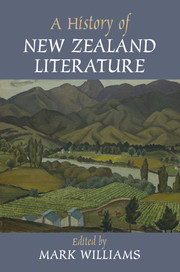Book contents
- Frontmatter
- Contents
- Notes on Contributors
- Acknowledgments
- Introduction
- PART I 1760–1920
- PART II 1920–1950
- 6 Colonial Ecologies: Guthrie-Smith's Tutira and Writing in the Settled Environment
- 7 Defiance and Melodrama: Fiction in the Period of National ‘Invention’, 1920–1950
- 8 Journalism and High Culture: Robin Hyde among the Cultural Nationalists
- 9 ‘Simply by Sailing in a New Direction’: The Poetics of Distance
- 10 ‘Rough Architects’: New Zealand Literature and Its Institutions from Phoenix to Landfall
- PART III 1950–1972
- PART IV 1972–1990
- PART V 1990–2014
- Index
9 - ‘Simply by Sailing in a New Direction’: The Poetics of Distance
from PART II - 1920–1950
Published online by Cambridge University Press: 05 April 2016
- Frontmatter
- Contents
- Notes on Contributors
- Acknowledgments
- Introduction
- PART I 1760–1920
- PART II 1920–1950
- 6 Colonial Ecologies: Guthrie-Smith's Tutira and Writing in the Settled Environment
- 7 Defiance and Melodrama: Fiction in the Period of National ‘Invention’, 1920–1950
- 8 Journalism and High Culture: Robin Hyde among the Cultural Nationalists
- 9 ‘Simply by Sailing in a New Direction’: The Poetics of Distance
- 10 ‘Rough Architects’: New Zealand Literature and Its Institutions from Phoenix to Landfall
- PART III 1950–1972
- PART IV 1972–1990
- PART V 1990–2014
- Index
Summary
The central irony inherent in all forms of cultural nationalism is that, in directing attention towards the local, the direction necessarily involves a consideration of the terms of separation and the nature of the geocultural space that is to be rejected in favour of the new; to emphasise the delimited requires the articulation of that which lies beyond its limits. For poets in New Zealand during the often heady days of literary nationalism, Allen Curnow's proclamation of the ‘Reality’ of the ‘local and special’ as the source of the written nation came couched within a complex set of ambivalences about the real, the invented, and the relation between the two. The invention of the literary/poetic nation required the equal invention of the culture from which it was separating, so the distance the nationalists carefully crafted from their English peers was foremostly an ideological space of translation and adaptation. In fact, as I will show, this idea of distance involved more than speculation on the relationship between English and New Zealand writing; it also speaks to a wide range of internal debates that cut through the developing literary community: distance conceived in terms of gender; of attitudes towards English expatriates participating in the nationalist project; and between the arts – conceived in a broad sense – and politics. If the 1930s were foundational in consolidating a ruling nationalism in New Zealand writing, they also shaped new counter-currents that worked within and outside of its boundaries.
The first ever anthology of New Zealand poetry (or ‘verse’), edited by W. F. Alexander and A. E. Currie and published in 1906, inevitably focused on anxious questions of separation and distance, even as its bold dedication – ‘For New Zealand’ – gestured towards a future that would be inspiringly national. In the introduction to what they acknowledge is a collection of ‘minor poetry’, Alexander and Currie note that while there will be a time ‘which some of us look for, when New Zealand will be assigned a place among nations not only on account of its exports of wool and gold, or for richness and worth in horses and footballers, but also by reason of its contribution to art’, it is nevertheless the case that ‘That time has not arrived’ and that what they term the ‘corpus of Anglo-Saxon literature’ still dominates the practice of writing (and indeed reading) poetry in the country.
- Type
- Chapter
- Information
- A History of New Zealand Literature , pp. 125 - 137Publisher: Cambridge University PressPrint publication year: 2016



